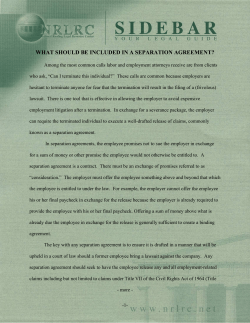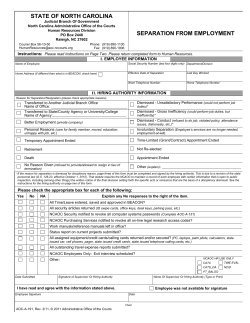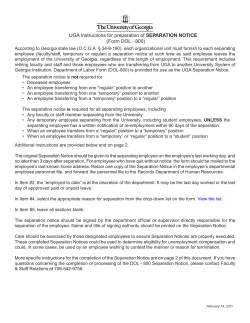
Separating together: Your options for separation and divorce
Separating together: Your options for separation and divorce About this handbook If you are facing relationship breakdown, separation or divorce, this guide will help you understand the options available to you to manage your separation in a way that minimises conflict and helps to maintain your privacy during this difficult time. If you think that your former partner poses a risk to you or your children, you should seek legal advice straight away about the options available to you. Separation or divorce can be traumatic, and should never be decided upon lightly. If you think that your relationship could benefit from counselling, we have listed organisations in this guide that may be able to help you and your partner to stay together. Legal aid is available for some people, subject to certain criteria, to assist with resolving your issues on divorce or separation. About Resolution Resolution is an organisation of around 6,500 professionals working with separating couples who believe that most problems are best solved without confrontation. Separation is always difficult, but our members’ experience is that resolving problems in a constructive way leads to the most satisfactory, lasting outcomes for couples and their families. 2 Separating together: your options for separation and divorce For more information W: www.resolution.org.uk T: 01689 820 272 E: info@resolution.org.uk To find a Resolution member visit: resolution.org.uk/findamember Foreword by Jo Edwards Jo is the Chair of Resolution and a family lawyer and mediator. She has campaigned for policy changes to improve peoples’ experience of the family justice system and has featured on national TV and radio talking about family law. If you’re going through relationship breakdown, it can be difficult to know where to turn for support around your separation. The family justice system, at first glance, can seem confusing and overwhelming. But there are ways that you can minimise conflict during your separation and reduce the stress and pain for yourself, your former partner and any children you have. You don’t have to go to court for your separation or divorce. If you and your former partner want to resolve matters you have many options available to you, including mediation, collaborative practice and arbitration, together with solicitor negotiation. These processes support you and your former partner to work together to decide what happens to your children after your separation, and how money and assets such as the family home will be divided between you. This can be quick and cost effective, giving you more control and enabling you to resolve your dispute and move on with your life. As a family lawyer, collaborative practitioner and a mediator, I have seen first-hand how powerful and effective non-court dispute resolution processes can be. They help people to achieve fairer outcomes from their separation and long lasting solutions that work for families and children. Minimising conflict during your separation can also reduce the emotional trauma on children. This handbook gives you an overview of the options available to you when you separate, and how you can choose the process that works best for you and your family. It helps you to understand the legal process, how to take the first steps and where to get the support you need. Resolution’s members - among them solicitors, financial advisers, family consultants and therapists - are committed to helping couples separate in a way that minimises conflict and puts the best interests of their children first. All of our members sign up to a Code of Practice, which commits us to working with clients in a constructive and non-confrontational way. Talking to a Resolution member early in your separation process will help you to understand the options available to you for your separation and how they apply to your personal circumstances. Divorce and separation are always traumatic, but by choosing the right process you can lessen the pain, for yourself and for your family; and look ahead more quickly to life after divorce. Jo Edwards, Chair, Resolution Foreword 3 Separating Together Separation or divorce can be difficult, but by getting help to work through the issues with your former partner, you can both move on with your lives more easily. Going through a separation affects both adults and children. Children often say that seeing their parents turn against each other is just as upsetting as the split itself. Your separation may also have an impact on your wider family, friends and colleagues. But your separation doesn’t need to involve going to court, and most couples manage to avoid this. If you decide to separate you have choices about how to negotiate with your partner, how to talk to your children, and how to settle issues arising from the end of a relationship and to keep matters private while your separation is being resolved. Contents: 5 5 5 5 What do I do? Who to talk to Legal aid What about money? 6 Putting children first 6 Tips for talking to your children 7 What children need to hear from both of their parents 7 Solving problems together 8 8 8 9 9 10 10 Your options for separation and divorce Mediation Collaborative process Family arbitration Negotiating between yourselves Solicitor negotiations and going to court 11 Where to go for help Back cover 11 What factors may influence 11 the route you choose? 4 Separating together: your options for separation and divorce What do I do? If you have decided to separate you need to take action to reach the best outcome for you and any children you have. Who to talk to Legal aid Once you have decided to separate you will need as much support as possible. Try to talk to your friends, family and colleagues to make sure that they know what you’re going through. You may be able to access public funding - known as legal aid - to get help resolving your family dispute. You should also contact a solicitor who is a Resolution member. However you decide to approach your separation, it is important that you understand your legal position. A Resolution member will be able to explain all the options for how you can separate, to help you find the right approach for you and your family. l l You can access legal aid for mediation. This will depend on your ability to pay (often referred to as your ‘means’) and whether mediation is right for you. If you are eligible for legal aid to cover the costs of mediation, you are also entitled to some independent legal advice funded through legal aid. Resolution members follow a Code of Practice meaning that they will always seek to minimise conflict and act in the best long-term interests of you and your children. Legal aid is available for certain family cases relating to finances and/or children, where there is evidence of domestic abuse or child abuse, or in cases where an order to protect someone from domestic abuse is needed. Speak to a Resolution member to find out if you qualify for legal aid. You can find a member near you at: Domestic abuse is where someone is aggressive, threatening or controlling towards their partner, or former partner. The abuse can be physical, emotional, psychological, financial or sexual. www.resolution.org.uk/findamember You can also check if you qualify for legal aid using the Ministry of Justice calculator: l It doesn’t matter whether the abuse happened regularly or just once, or if it was threatened. If this applies to your situation, speak to a Resolution member who can help you identify the evidence you need to claim legal aid. www.gov.uk /check-legal-aid What do I do? 5 Putting children first The end of your relationship will be a difficult time for you, but if you have children it may be even more difficult for them. The way you talk to your children about your separation will help them to feel secure and loved by both parents. This is easiest if you can maintain a civilised, practical working relationship with your former partner. Tips for talking to your children l If possible, sit down and tell your children about your separation together. This will help to show your children that you are still their parents, no matter what has happened. l Talk in general terms, like “mum and dad Children have a right to love both of their parents, even if they are living apart. In nearly all circumstances, your children will be happier now and in the future if they have a good relationship with both parents. This is easiest to achieve if you can maintain a respectful relationship with your former partner. Blaming one parent for the split will be confusing and difficult for your children. They might worry about betraying one of their parents, or that they are no longer loved. Remember – while your relationship with your partner might have ended, your joint role as parents has not. 6 Putting children first have decided that we would be happier living in different homes.” Children shouldn’t have to worry about adults’ problems. l Children will be worried about how their life will change – where they will live, how often they will see each of you and how life might be different. Try and develop answers to these questions as soon as possible and let them know that it’s okay to ask questions. l Children often feel responsible when their parents break up. Make sure you reassure them that nothing is their fault and that they can do nothing to change the situation. l Different children will react in different ways. They might be angry, upset or seem to show no reaction at all. In families where there has been a lot of fighting, children might even be relieved. It’s important to let children know that their feelings are normal and that they can always talk to you. l Talking to children about your separation during an everyday activity, such as playing football or doing the food shopping, can make the situation less tense and help the children feel that they are not being interrogated about their feelings. This can help them to open up. l Some children don’t want to talk; perhaps because they think that discussing the break up will make it “too real”. You can let your children know that you understand this is hard for them, and that you will listen whenever they are ready to talk. l Take care of yourself. Make sure that you have support around you to help you through this period, without leaning on your children or burdening them with your worries. l If your child is particularly upset by the situation and finding it difficult to communicate, a Resolution member will be able to refer you to a professional in your area who can help. What children need to hear from both of their parents l The feelings we have for each other have changed, but we will never stop loving you and being your parents. l We know this will be hard for you and we are sorry. l This is a grown-up problem between mum and dad. You can’t change it and it’s not your fault. l We will always be your parents, and you can love us both. l We will both continue to be part of your life. Solving problems together Fighting makes the process of separating more painful for you and your children. You might be able to resolve the consequences of your separation by talking to your partner (turn to page 8 for tips on how to do this). Putting children first 7 Finding out what works for you When you separate, sorting out arrangements relating to your children or money can often be resolved without going to court, maintaining your privacy while you settle matters between yourselves. It is possible to keep conflict to a minimum. It is important to speak to a family law professional who can talk you through all of your options to find the one that best suits you and your family. Instead of going to court, you can choose to address the legal consequences of your separation using methods like mediation, arbitration or the collaborative process. These allow you and your former partner to work out solutions which give you more control over outcomes and are right for you and your family, supported with professional help. Legal aid is available for mediation for those eligible and where it is suitable, to assist with resolving your issues on divorce or separation. Mediation Mediation helps couples work things out together. It is not a form of relationship counselling, or a way to help a couple get back together. Instead it helps couples who are separating decide how to end their relationship. During mediation you and your former partner, helped by a trained mediator, talk through the issues (such as money, children or any other consequences of the separation) that you need to solve, and work out what is best for you and your children. The number of mediation sessions you will need will depend on you and your partner’s requirements. Most people going through mediation find it helpful to take advice from a family solicitor during the process. Solicitors can make sure that agreements reached in family mediation are fair and legally binding. Many couples say that mediation helped them to divorce or separate without increasing levels of hostility and to keep matters private, and that discussing their problems face to face helped them to reach fair solutions. “It increased transparency in the solution, and put the children where they belong, as the highest priority in the situation”. Eileen – used mediation 8 Your options for separation and divorce “Arbitration has been an effective and fast process for us to resolve the issues that we couldn’t agree on. We were able to set a tight timescale and to go through the process without further hearings” Mark – used arbitration Collaborative process Family arbitration The collaborative process lets you work through the issues you need to resolve, with you and your former partner each having a specially trained collaborative lawyer by your side at each meeting. The number of meetings will depend on the extent of the issues. Family arbitration is a way of reaching a decision about your finances or property if your relationship has broken down and you are unable to sort things out between yourselves or through another form of dispute resolution. During each session, you and your solicitor will meet with your former partner, together with their solicitor, to work out the details of your separation. You will therefore have support and legal advice as you go. You will be able to decide which topics to focus on and whether to involve other experts, such as people trained to help children through the process or pensions specialists. The collaborative process is a private way to solve problems without having to go through court. Everyone signs an agreement that commits each party to trying to resolve the issues. Your collaborative lawyer will not be able to represent you in court if negotiations break down, which means that all are committed to finding the best solutions by agreement. “It was very reassuring to have my lawyer at my side throughout the negotiations, at the same time as being able to talk to my ex face to face”. Ben – used collaborative process Like a judge, an arbitrator will make sure all the relevant facts are gathered together. They will also collect evidence from you and your partner, and take into account your views on what you think should happen. The arbitrator will then give a ruling, known as an “award”. Although the choice to arbitrate must be one you both agree on, once the process has started one of you cannot back out without the other’s agreement, and you agree at the outset to accept the award. Arbitration is an alternative to court and asking a judge to make a decision. The advantages are speed, flexibility, confidentiality and the ability to choose an arbitrator best suited to deal with the specific circumstances of your case. Although you will need to pay for the arbitrator’s services, arbitration is more costeffective than court proceedings. Arbitrators are located across the country and come from a wide range of legal backgrounds. They are all experienced family lawyers who are independent of either party. Find a family arbitrator at ifla.org.uk Your options for separation and divorce 9 Negotiating between yourselves Going to court Negotiating your own agreement can be the cheapest and easiest way to reach a settlement following separation. This option isn’t suitable for everybody, but it can work if you have mutually agreed to separate, remain on good terms and generally agree on issues relating to your property and any children you have. For some people going to court will be the right option, because agreement can’t be reached or there is a particularly difficult or unique aspect to the case. If you choose this route, or if it becomes necessary, a Resolution member can talk you through every stage. The divorce process itself will be dealt with alongside, but separate from, any issues regarding money or your children. Even if you agree, it is important to take legal advice to make sure that you understand the implications of your agreement, and so the agreement you make is legally binding. You can help this process to work well by choosing a Resolution member, who will share your aim of an amicable separation. Solicitor negotiations If mediation, arbitration or the collaborative process are not for you, your solicitors can negotiate an agreement. Issues between separating couples are often successfully resolved with the support and expertise of a Resolution member. 10 Your options for separation and divorce There is usually a legal requirement for you to attend a Mediation Information and Assessment Meeting (known as a MIAM) before the court process begins, to see whether mediation or another process is right for you. There are, however, some circumstances where this is not required (such as matters of urgency). Often couples want to avoid conflict, court costs and delays and the uncertainty of what a judge will decide. Even if you decide to go to court, an agreement can be reached before a Final Hearing. When this happens, a Consent Order is sent to the court for final approval by the judge. If you cannot reach a final agreement, the judge will make a binding decision on what he or she thinks is fair. Where else to go for help These organisations can help you with information and support. Resolution - www.resolution.org.uk/findamember T: 01689 820 272 E: info@resolution.org.uk Twitter: @ResFamilyLaw Many organisations can help with specific issues around your separation. Here are just a few as a starting point: CAB - www.adviceguide.org.uk Families Need Fathers - www.fnf.org.uk or call 0300 0300 363 Family Lives - www.familylives.org.uk or call 0808 800 2222 Fatherhood Institute - www.fatherhoodinstitute.org Gingerbread - www.gingerbread.org.uk Home-Start - www.home-start.org.uk or call 0800 068 6368 Money Advice Service - www.moneyadviceservice.org.uk or call 0300 500 5000 Mumsnet - www.mumsnet.com/divorce-and-separation Only Dads - www.onlydads.org Only Mums - www.onlymums.org Parent Connection - www.theparentconnection.org.uk Relate - www.relate.org.uk or call 0300 100 1234 4Children - www.4children.org.uk Where else to go for help 11 Choosing the right process for you and you family Each family is different. Some of the questions you might want to ask yourself when deciding how to manage a divorce or separation are: l What would be best for your children? l Do you want to feel in control of the l decision being made about your l family’s future? l Do you want to avoid a lengthy l battle? l Do you want an option that will bring l certainty and closure? l Are your financial affairs complicated l and unclear? l Do you want the process to be as l painless as possible? l Are you up against a powerful l personality and don’t want to deal l with things on your own? l Do you want to understand and l influence what is happening during l your separation? l Do you need support to secure a fair l outcome? l When things were going well, were l you able to resolve differences l between yourselves? l Do you want to keep control of the l costs? l Do you think you will eventually l be able to reach agreement with your l former partner? Think through the issues that are important to you and your family and talk them through with a solicitor. You can find more free advice and information on the Resolution website: www.resolution.org.uk If you are divorcing or separating, a Resolution member will be able to talk you through your options. Some will provide initial advice without charge. Resolution – www.resolution.org.uk/findamember or call 01689 820 272
© Copyright 2025









